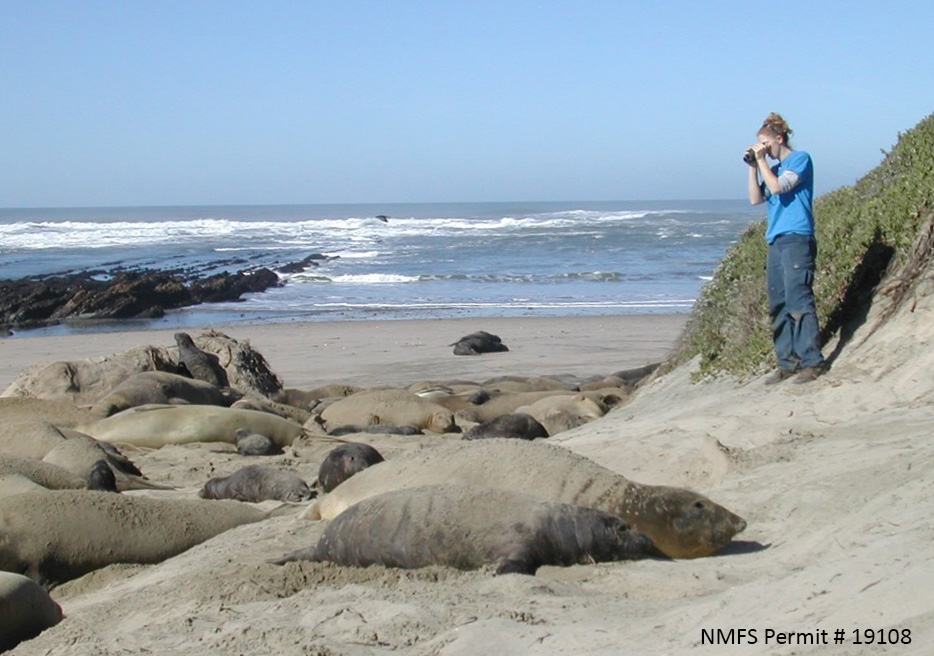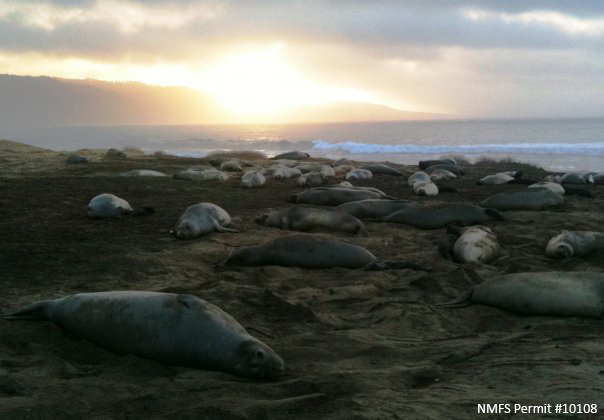By Kate High, SJSU undergraduate
Third installment of the blog series by students enrolled in MS 211: Ecology of Marine Mammals, Birds and Turtles with faculty member Dr. Gitte McDonald.

Interning in the Vertebrate Ecology Lab at Moss Landing Marine Laboratory this past year has given me countless opportunities to participate in activities most undergraduate students at SJSU might not know exist. I began training for elephant seal research at Año Nuevo State Park at the beginning of January. Even though I’ve had a lot of field experience, I can honestly say I have never been more nervous about a field day in my life.
I was getting trained to help with tag re-sights as well as weaner weighing. This was my first time working with pinnipeds and of course we were working with the largest North American species. There are a couple things that stick with me from that first field day. The first one is Dr. McDonald’s ultimate rule “First is our safety, then the animal’s, then comes the science.” The second was being surprised that most males were calm and paid little to no attention to us. This is in contrast to some females, who made my heart jump because of a reaction I got from some seals.
The first time out to Año Nuevo, your head feels like it’s spinning around because there’s so much activity on the beach. You have to be alert and aware of your surroundings, all while trying to collect accurate data. But through all the chaos there are moments when you can appreciate the beauty of the surroundings and the excitement of the work. Before you know it, the season has wrapped up and the beach at Año Nuevo seems empty.

There are many memories I will cherish from my first season at Año. I’ll never forget walking in the crisp air as the sun was rising, and being able to both hear and see the male elephant seals trumpeting in the distance. There were weeks where it seemed as if you couldn’t walk anywhere on the beach because there were so many females and pups packed in. I loved doing tag re-sights of pups and coming across a group of deep sleepers that happened to be snoring, or weaners that would accidentally roll down a hill. I’ll always remember my individual trip out with Dr. McDonald as a great chance to ask questions and to hear about her experiences in the field. Although some days it was windy and raining and we were wet and cold, being out in the field and having this experience was a privilege.
Some might wonder if the researchers doing field work out at Año Nuevo get tired of their work out there - my answer would be an immediate “No.” The group of researchers and volunteers I worked with were always enthusiastic and supportive, and willing to teach. I was always ready for field day as soon as my alarm went off. I would tell myself before I went out each time, “A million people would kill for this experience and to be in your shoes. Don’t take today for granted.” And as cheesy as it sounds, Año Nuevo never got less magical for me.

